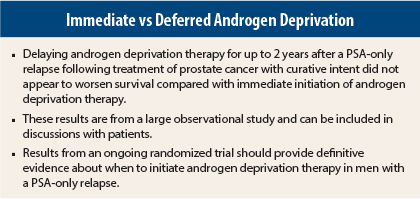In men with prostate cancer and a prostate-specific antigen (PSA)-only recurrence after curative surgery or radiation, delaying androgen deprivation therapy for at least 2 years or until clinical progression (ie, new symptoms, metastasis by imaging techniques or short PSA doubling time) did not appear to impact survival or prostate cancer–specific survival compared with immediate initiation of androgen deprivation therapy within 3 months of PSA-only recurrence. These results of a large, population-based study, developed jointly by the Harvard School of Public Health and University of California, San Francisco, are suggestive and can be included in discussions with patients, but they are by no means definitive, say experts. The study was presented at the 2014 ASCO Annual Meeting.1
Grey Area
“Immediate vs deferred androgen deprivation therapy for men with a PSA-only recurrence is a grey area. The [National Comprehensive Cancer Network] guidelines say that the role of [androgen deprivation therapy] in this setting is a ‘therapeutic dilemma,’” noted lead author Xabier Garcia-Albeniz, MD, a research associate at the Harvard University School of Public Health in Boston. “These findings suggest that there may be no need to rush to [androgen deprivation therapy]. Obviously, this is an observational study with several limitations, and the issue of when to start [androgen deprivation therapy] is being studied in an ongoing randomized phase III trial. The results of that trial will answer the question and serve as the gold standard.”
The study analyzed data on more than 14,000 patients included in a prospective registry called CaPSURE (Cancer of the Prostate Strategic Urologic Research Endeavor, based at the University of California, San Francisco). Among these patients, 2,012 men experienced a PSA-only relapse following curative surgery or radiation.
PSA relapse was defined as ≥ 0.02 ng/mL if treated with radical prostatectomy or three rising PSA levels 1 month apart if primary treatment was radiation-based. Patients had to be asymptomatic and without evidence of metastasis. These patients were treated in usual practice settings. The evaluated strategies were (1) immediate androgen deprivation therapy (within 3 months of rising PSA) and (2) deferred androgen deprivation therapy (at least 2 years after PSA-only relapse, or when they had metastasis, symptoms, or short PSA doubling time).
Key Findings
Median time from primary treatment to PSA relapse was 27 months. Median follow-up after PSA relapse was 41 months. Median age was 69 years (range, 63 to 74 years); 33.8% had a Gleason score > 7; and 31.8% received radiation as primary treatment.
There were 176 deaths recorded during follow-up; 37 were due to prostate cancer. Five-year survival rates were 87.2% (95% confidence interval [CI] = 84.5%–90.0%) for the deferred androgen deprivation therapy group and 85.1% (95% CI = 77.6%–92.7%) for those treated with immediate androgen deprivation therapy. Ten-year survival was identical in both groups: 71.6%.
Study Limitations
As with every observational study, this investigation has limitations, Dr. Garcia-Albeniz acknowledged. Although the best statistical resources were used to adjust for prognostic differences between strategies, we still rely on the assumption of absence of unmeasured confounding factors. He looks forward to results of the large randomized trial studying this issue.2
“Ideally we base treatment decisions on randomized trials. In real practice, we don’t have the answers to the question yet. We can use this information from an observational study in our discussions with patients. This study won’t change clinical practice, but it might help men make decisions. We need to wait for the gold standard,” Dr. Garcia-Albeniz stated. ■
Disclosure: The study authors reported no potential conflicts of interest.
References
1. Garcia-Albeniz X, Chan JM, Paciorek AT, et al: Immediate versus deferred initiation of androgen deprivation therapy in prostate cancer patients with PSA-only relapse. ASCO Annual Meeting. Abstract 5003. Presented June 1, 2014.
2. Androgen deprivation therapy in treating patients with prostate cancer. Available at clinicaltrials.gov, identifier NCT00110162, last updated August 6, 2013.



